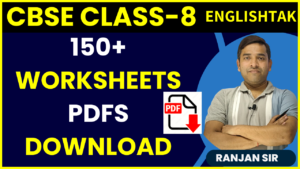![]()
Class 10 English Important Short Questions For Board Exams
Class 10 English Important Short Questions For Board Exams – As the CBSE Class 10 board exams for 2024-25 approach, students are gearing up to tackle a range of critical themes in their English literature syllabus. As students prepare for their exams, it’s essential to grasp the intricate relationship between scientific progress and ethical responsibility. In this blog, we’ll explore pivotal questions related to this theme, ensuring that you’re well-equipped to excel in your board exams.
Join Our Group
Class 10 English Important Short Questions For Board Exams
Answer the following five questions, in about 40-50 words.
(i) Analyze the pilot’s decision to follow the guidance of the unknown black airplane despite the storm and his loss of navigation tools. (Two Stories about Flying-The Black Aeroplane)
Answer: In “The Black Aeroplane,” the pilot follows the mysterious black airplane due to his desperation in the storm. With his instruments failing and no way to navigate, he trusts the unknown plane to guide him to safety. This decision highlights his hope and reliance on unexpected help during crisis.
(ii) What deeper message about life does the poem “Dust of Snow” convey through its depiction of a seemingly small incident?
Answer: In “Dust of Snow,” the poet conveys that even small, seemingly insignificant incidents can have a profound impact on our mood and perspective. The dust of snow falling on the poet unexpectedly uplifts his spirits, reminding us that nature and simple moments can bring positive change in life.
(iii) What motivates Anne to keep a diary, and why does she believe she can trust it more than people? Support your answer with examples from the text. (From the Diary of Anne Frank)
Answer: Anne is motivated to keep a diary because she feels lonely and misunderstood, lacking a true friend to confide in. She believes she can trust her diary more than people, as it allows her to express her thoughts and emotions freely without fear of judgment, offering her comfort.
(iv) Discuss the poem’s tone and mood through its exploration of “fire” and “ice”. How do these elements contribute to the overall atmosphere of the poem? (Fire and Ice)
Answer: In “Fire and Ice,” the tone is reflective and contemplative, while the mood is ominous. “Fire” symbolizes desire, and “ice” represents hatred, both destructive forces. Their exploration creates an atmosphere of inevitability and doom, suggesting that human emotions can lead to the world’s end.
or
In “Fire and Ice,” the tone is thoughtful, and the mood is dark. “Fire” stands for desire, and “ice” symbolizes hate, both powerful enough to destroy the world. These ideas create a feeling of danger, showing how strong emotions can lead to destruction.
(v) How does the writer recognize the baker’s arrival in “A Baker from Goa,” and why do the characters eagerly anticipate his visit?
Answer: In “A Baker from Goa,” the writer recognizes the baker’s arrival by the sound of his bamboo staff thudding on the ground. The characters eagerly anticipate his visit because the baker brings delicious bread and sweets, which are important for special occasions and daily life in the village.
Most Important English Questions Answers For Board Exams
(vi) According to Buddha how does weeping and grieving affect an individual and why don’t the wise grieve? (The Sermon au Benares)
Answer: According to Buddha, weeping and grieving cause more suffering and pain, as they do not help in overcoming loss. Grief keeps a person trapped in sorrow. The wise do not grieve because they understand that death is a natural part of life, and mourning cannot change it.
(vii) “Man’s goodness is a flame that can be hidden but never extinguished”? Why does Mandela say so? (Nelson Mandela Long walk to Freedom)
Answer: Nelson Mandela asserts that “Man’s goodness is a flame that can be hidden but never extinguished” to convey that human kindness persists despite adversity. Even in oppressive conditions, people’s inherent goodness remains, emphasizing hope and the potential for positive change, no matter the circumstances.
(viii) What does Valli’s bus ride reveal about her character, and her perspective of life? (Madam Rides the Bus)
Answer: Valli’s bus ride in “Madam Rides the Bus” reveals her curiosity, independence, and desire for freedom. She eagerly anticipates the experience of traveling alone, showing her adventurous spirit. Her observations during the ride reflect her maturity and unique perspective on life, as she enjoys both the thrill and realities of adulthood.
(ix) What message does the poem Amanda convey about the importance of balancing discipline and freedom of children?
Answer: The poem “Amanda” conveys the message that children need a balance between discipline and freedom. While discipline is important for teaching responsibility, too much control can stifle a child’s creativity and individuality. The poem highlights the need for children to have the freedom to explore and express themselves, promoting their overall development and happiness.
(x) How does Robert Frost employ the concept of “significant little things” in ‘Dust of snow’ explore the relationship between human emotions and the natural world? (Dust of Snow)
Answer: In “Dust of Snow,” Robert Frost uses the concept of “significant little things” to illustrate how small moments in nature can profoundly impact human emotions. The falling snow, a seemingly minor event, shifts the speaker’s mood from despair to hope. This connection emphasizes that nature can influence our feelings and perspectives, showing how simple experiences can lead to positive change in our lives.
Class 10 English Important Short Questions For Board Exams
(xi) The story His First Flight’ explores the thought that “to escape fear, you have to go through it and not around it”. Evaluate critically (Two Stories About Flying)
Answer: In “His First Flight,” the protagonist must confront his fear of flying to achieve his goal. This journey illustrates that facing fear head-on is essential for personal growth and overcoming challenges. By embracing his anxiety rather than avoiding it, he ultimately gains confidence and learns to soar, symbolizing empowerment through struggle.
or
In “His First Flight,” the main character learns that to overcome his fear of flying, he must face it directly instead of avoiding it. This story shows that confronting fears leads to personal growth. By facing his anxiety, he gains confidence and learns to fly, symbolizing strength through challenges.
(xii) Evaluate the transformation of Tricki during his hospitalization. What factors contribute to his recovery and return to health? (A Triumph of Surgery)
Answer: In “A Triumph of Surgery,” Tricki transforms from a pampered, unhealthy dog to a lively, fit one during his hospitalization. His recovery is due to a proper diet, exercise, attentive care from the veterinary staff, social interaction with other dogs, and a change in environment.
(xiii) Discuss the narrator’s internal struggle between his criminal tendencies and his growing attachment to Anil. How does this conflict drive the plot? (The Thief’s Story)
Answer: In “The Thief’s Story,” the narrator struggles between his criminal instincts and his growing attachment to Anil. Initially intent on stealing, he admires Anil’s kindness, creating conflict. This internal struggle drives the plot, culminating in his decision not to steal, showcasing his transformation through friendship.
(xiv) Why did Horace Danby decide to rob safes every year? Explain how his love for books influenced his criminal activities, (A Question of Trust)
Answer: Horace Danby decided to rob safes every year to fund his passion for collecting rare books. He was a skilled locksmith, using his expertise to commit the crimes without causing harm. His love for books fueled his criminal activities, as he believed that stealing was the only way to afford his cherished collection while maintaining a respectable appearance in society. Ultimately, his obsession with books led him to a fateful encounter that highlighted the consequences of his choices.
(xv) Matilda’s husband is an epitome of love, patience and sacrifice A husband every woman aspires for. Explain with evidence from the text. (The Necklace).
Answer: In “The Necklace,” Matilda’s husband, Monsieur Loisel, embodies love, patience, and sacrifice. He sacrifices his savings for her dress and reassures her about the lost necklace, promising to replace it. His dedication and hard work to repay the debt for ten years highlight his ideal qualities as a husband.
(xvi) How does Ausable’s physical appearance contradict his profession and personality? (The Midnight Visitor)
Answer: In “The Midnight Visitor,” Ausable’s physical appearance contradicts his role as a secret agent. He is described as small, plump, and somewhat unassuming, lacking the typical attributes of a daring spy. This contrasts with his cleverness and confidence, as he uses his wits to outsmart the intruder. His appearance leads others to underestimate him, which he cleverly exploits, demonstrating that true strength lies in intelligence rather than physicality.
(xvii) In what ways did Ebright’s varied interests and skills contribute to his scientific achievements? (The Making of A Scientist)
Answer: Ebright’s varied interests and skills contributed to his scientific achievements by fostering curiosity and exploration. His proficiency in biology and chemistry, along with research experience from science fairs, enhanced his problem-solving abilities. Support from his mother also provided opportunities, fueling his passion and success in science.
English For CBSE Class 10 Board Exams
Dust of Snow Summary and Theme
Dust of Snow Explanation and Poetic Device
Fire and Ice Poem Summary and Theme
Two Stories about Flying Very Short Questions
How I Taught My Grandmother to Read Extra Question Answers
Essay on Teacher’s Day in English





